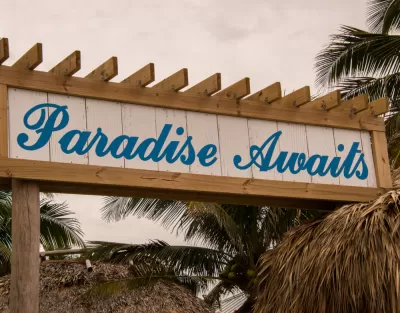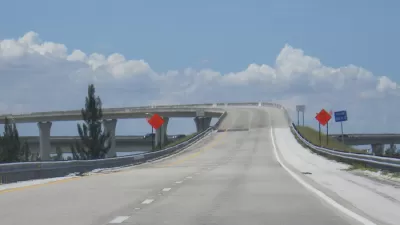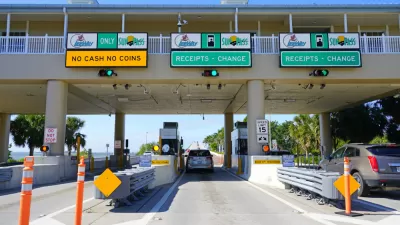The state of Florida is moving forward with the Multi-use Corridors of Regional Economic Significance (M-Cores) plan to build several new toll expressways in rural parts of the state.

Daniel Herriges does not mince words when assessing a plan advancing through the Florida Legislature "that would construct three new toll roads totaling more than 300 miles, and would divert over $1.3 billion from the state's general fund to pay for them."
"These roads would mostly parallel existing Interstate 75 through parts of the state that are rural and very sparsely populated. The proposed routes pass through what are now cattle pastures, citrus groves, and pine forests. The largest city on the longest of the three routes—Perry—has fewer than 10,000 inhabitants."
So how is the state justifying the need for such an immense expenditure on new roads? Herriges doesn't think it can. "There is absolutely no present, looming problem that these toll roads would solve. None."
While dispensing with potential pro-road project arguments like existing congestion and need for Hurricane evacuation capacity, Herriges gets to the fundamental argument of the article: "When we talk about the need to 'prepare' for growth with a brand new road deep into a rural area, we're glossing over a huge chicken/egg problem." The state of Florida doesn't have to grow in this mostly rural setting, according to Herriges, but there are some already wealthy interests who stand to benefit if it does.
After winning nearly unanimous approval from the Florida State Senate, the plan is now moving to the House. Herriges also recommends reading an opinion piece by Thomas Hawkins on the subject of the Multi-use Corridors of Regional Economic Significance (M-Cores) plan, written for the Gainesville Sun.
FULL STORY: Want to Be Prepared For Future Growth? Do the Opposite of This.

Alabama: Trump Terminates Settlements for Black Communities Harmed By Raw Sewage
Trump deemed the landmark civil rights agreement “illegal DEI and environmental justice policy.”

Planetizen Federal Action Tracker
A weekly monitor of how Trump’s orders and actions are impacting planners and planning in America.

How Atlanta Built 7,000 Housing Units in 3 Years
The city’s comprehensive, neighborhood-focused housing strategy focuses on identifying properties and land that can be repurposed for housing and encouraging development in underserved neighborhoods.

In Both Crashes and Crime, Public Transportation is Far Safer than Driving
Contrary to popular assumptions, public transportation has far lower crash and crime rates than automobile travel. For safer communities, improve and encourage transit travel.

Report: Zoning Reforms Should Complement Nashville’s Ambitious Transit Plan
Without reform, restrictive zoning codes will limit the impact of the city’s planned transit expansion and could exclude some of the residents who depend on transit the most.

Judge Orders Release of Frozen IRA, IIJA Funding
The decision is a victory for environmental groups who charged that freezing funds for critical infrastructure and disaster response programs caused “real and irreparable harm” to communities.
Urban Design for Planners 1: Software Tools
This six-course series explores essential urban design concepts using open source software and equips planners with the tools they need to participate fully in the urban design process.
Planning for Universal Design
Learn the tools for implementing Universal Design in planning regulations.
Caltrans
Smith Gee Studio
Institute for Housing and Urban Development Studies (IHS)
City of Grandview
Harvard GSD Executive Education
Toledo-Lucas County Plan Commissions
Salt Lake City
NYU Wagner Graduate School of Public Service





























